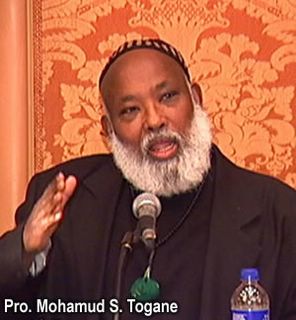|
About Togane's Official Website
 Poet Togane Poet Togane
Togane.org is the home of Prof. Mohamud Siad Togane’s work including poetry, articles, and speeches in text, audio
and video.
“A native of Somalia and a 1969 graduate of Eastern Mennonite College, poet Togane is a rare breed
of believer, an amalgam of many roots and influences. His urgent and sometimes profane essays - many of them cast as long
polemical poems - address political and social issues that remain volatile for Somalis and other Africans. Clannism, political
corruption and religion are frequent topics when Togane addresses his countrymen.”
Mohamud Siad Togane has been
living in Canada since 1973. He has became a Canadian citizen in 1978 and now resides in Quebec.
Togane’s works
include: The bottle and the Bushman: Poems of the Prodical (1986), Eternal Conversations (2003), Fifty years, fifty stories
(2003), Bridges: Literature Across Cultures ( 1994) Quebec Suite: Poems for and about Quebec (1995) Togane has also written
articles for several newspapers and magazine including The Globe and Mail, Zymergy: A Literary Montreal Magazine, African
Art (University of California) and AfricanCanadian.
He has also taught and lectured at universities of Waterloo, Hamburg,
Concordia , Rutgers, McGill, and Toronto.
Togane’s new book—News from Home will be published this Spring.
Read
more at Prof. Togane's official webiste.
 SOMALIA: Hope for calm as government takes over Beletweyne SOMALIA: Hope for calm as government takes over Beletweyne
BELETWEYNE, 31 July 2009 (IRIN) - A week after
government forces took control of Beletweyne in central Somalia's Hiiraan Region, residents and internally displaced people
(IDPs) hope the prevailing calm will enable them to resume normal life.
"We are really hoping for peace and stability
so as to go back to our homes," Sagal Ahmed, 18, an IDP in Jowhar, Middle Shabelle region, told IRIN on 30 July. "I delivered
my baby as I fled fighting [in Mogadishu] on 26 July when heavy gunfire erupted in our camp between opposition forces and
government. Since our displacement, the drought has made food scarce and the insecurity has affected the ability of aid agencies
to reach us."
When President Sharif Sheikh Ahmed declared emergency law on 21 June, a section of Beletweyne was under
the control of Al-Shabab, an Islamist opposition militia, while the government controlled the remainder.
Beletweyne
residents have expressed hope for real peace since the government took full control of the town on 26 July.
"If the
struggle for control of the town between the government and the Al-Shabab finally ends, then we do have a chance of accessing
services such as healthcare and humanitarian assistance," a Beletweyne resident said.
According to Ali Mohamed Gedi,
Beletweyne's police commissioner, a 6pm-6am curfew has been imposed on the town to restore security.
"The local people
are happy about the curfew," Gedi said. "We have a good opportunity [to restore security] because the people of Hiiraan need
peace and government institutions. We will lift the curfew when we are satisfied that the town's stability can be guaranteed."
Gedi added that the curfew was not affecting emergency services such as getting the sick and pregnant women to hospital.
Although business is returning to normal in the town, the government's regional and administrative offices have not
reopened since they closed in 1991 following the ouster of then President Siad Barre.
On 12 July, Al-Shabab suffered
a major military setback in the Somali capital, Mogadishu, when they lost significant territory to government troops.
Mogadishu
has been a battleground for government troops and Al-Shabab, which controls much of the south and centre of the country.
Since
fighting between the government forces and the militia group escalated in early May, more than 200,000 Somalis have fled their
homes, according to the UN.

Photo: Abdisamed Mugadishu/IRIN  |
| Somali IDPs hold up a banner during a
demonstration in the Afgoye Corridor over claims that two NGOs were to discontinue water provision to the IDP camps | Water shortages
IDPs from 47 camps on the Afgoye corridor near Mogadishu have
held demonstrations since 2 July to protest against an alleged plan by two NGOs to discontinue water provision to the camps.
The displaced - most of whom fled Mogadishu over the past three years and sought refuge in Elasha Biyaha, Hawa Abdi
and Lafole IDP settlements - appealed to the Centre for Education and Development (CED) and Oxfam Novib to continue water
supplies.
The demonstrations followed reports that the two NGOs were planning to discontinue water supplies because
of financial constraints. The IDPs were also reacting to claims that Oxfam had halted its financial support to CED, which
has rehabilitated water wells in several centres in Elasha, Hawa Abdi and Heile areas.
Nurto Islow Madey, a mother
of five and an IDP at the Jimale Camp in Elasha, said the move would greatly affect people with large families like hers as
accessing water was already difficult for most displaced.
Madey's husband was killed when a mortar fell on their Mogadishu
home in April, leaving her the family's sole provider.
|
[ENDS] |
[ |
|
|
|






